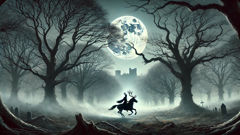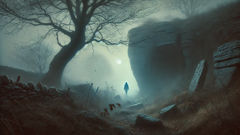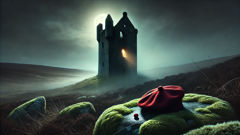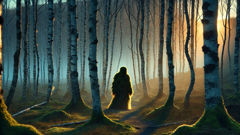Introduction
There are places in the Romanian Carpathians where the trees grow so thick and old, their twisted roots knit the earth like secrets. In these ancient woods, mists linger in the hollows and the wind sings in a voice older than memory. Villagers say that the forest has a soul, and to wander too deep is to risk waking it. For centuries, fireside tales have warned children not to stray from paths or mock the shadows. But among all the whispered stories, none chills the heart quite like the legend of Muma Padurii—the Mother of the Forest. She’s spoken of as a twisted old woman, her skin the color of tree bark, her eyes flashing green as wild moss. Some say she’s a witch, others a spirit bound to the wild. Children fear her for her cunning; grown folk respect her as an ancient force. It is told that she tends the woodland beasts, stirs storms, and can curse those who wrong the forest. Yet, she’s most feared for her mischief: she lures the unwary, especially children, deeper into the gloom until they lose themselves. Still, her story is more than a warning—it is a tangle of fear and reverence, a tale as knotted as the woods themselves. The legend is woven into every songbird’s call and every wolf’s howl on a winter’s night. It’s painted in the mossy hush beneath fir trees, in the silence that falls when dusk slips between the branches. There’s a reason no child dares to enter the woods alone, even on the brightest day.
Whispers Among the Pines
Long before Anca was born, tales of Muma Padurii curled through the villages at the forest’s edge. Elders claimed she could twist a man’s path with a mere glance, making him circle the same tree until moonrise. Hunters who returned from the deep woods with empty hands blamed the Mother of the Forest for turning game to shadow. Once, it was said, a woodcutter mocked an owl’s cry and vanished without trace—leaving only a single shoe tangled in a bramble. These stories grew in the telling, each generation adding a new root to the legend, until fear itself seemed to sprout from the soil.
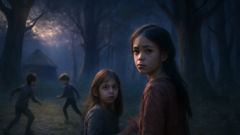
Yet in the village of Stânca Veche, life pressed on beneath the looming firs. Children played at the forest’s edge, daring each other to step into the gloom. Their laughter rose and fell like birdsong, bright against the hush of moss and fallen needles. Anca was among the boldest, her copper hair a banner as she raced along the boundary stones. She lived with her grandmother, Baba Ileana, whose hands were as knotted as the oaks and whose stories shaped the world at dusk. "You must respect the forest," Baba would say, her voice low as thunder over distant peaks. "Muma Padurii watches from the shadows. She is neither evil nor kind—she is wild."
Anca listened, but her heart tugged at the unknown. The woods seemed to pulse with a living heartbeat, and sometimes, when she slipped out at dawn to gather mushrooms or wild strawberries, she felt eyes on her. Once, she glimpsed a tatter of gray skirt vanishing behind a pine, but when she called out, only silence answered.
That summer, something changed. Crops failed on the southern fields, and a strange sickness settled on the cattle. Folk muttered that the Mother of the Forest was displeased. One evening, as fog pressed low and the sun bled red between the trunks, little Ilie—the youngest of the shepherd’s sons—vanished from the pasture. His footprints trailed into the woods and stopped where the ferns grew thickest. The village held its breath.
Panic bred suspicion. The elders gathered, murmuring of old bargains and forgotten wrongs. Some accused Baba Ileana of knowing too much, her herbs and charms now regarded with unease. Anca’s world shrank to a circle of fear: doors barred at night, prayers whispered over sleeping children, and the forest’s edge drawing ever closer in their minds. But in her dreams, Anca heard a voice that was neither cruel nor kind—it was wild, echoing her grandmother’s words. She knew she had to act.
That night, while moonlight draped the rooftops in silver, Anca stole from her bed. With a satchel of bread and a sprig of rowan for protection, she slipped past the boundary stones. The woods welcomed her with a hush that was almost relief, as if it had waited long for someone brave enough to enter with open eyes.
Into the Heart of the Wild
With every step Anca took beneath the moonlit canopy, the world changed. The air grew cooler, filled with the scent of damp earth and crushed pine needles. Branches stretched overhead, forming arches that blotted out the stars. The path behind her faded quickly; moss crept over her footprints as if the forest itself wished to keep her.
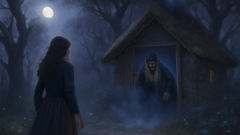
She walked deeper, guided by instinct and the faintest shimmer of foxfire fungi along a fallen log. Now and then, Anca heard the soft snap of twigs, the flutter of wings, and—once—the shrill cry of a nightjar. Fear dogged her heels, but she pressed on. The silence was thick, broken only by her measured breaths. She recalled her grandmother’s tales: that Muma Padurii could appear as a stooped hag or a young woman with tangled hair, or even as a wolf or owl. Above all, she must show respect. Never insult the trees, never steal more than she needed, never mock the spirits.
After what felt like hours, Anca came upon a clearing ringed by ancient yew trees. In the center, moonlight spilled across a hut made of woven roots and bark. Smoke twisted from its crooked chimney, and a patchwork of herbs hung drying by the door. The place throbbed with an energy that was both inviting and perilous. Anca’s heart hammered. She stepped forward.
A shadow detached itself from the doorway. Muma Padurii stood before her—neither as monstrous nor as beautiful as legend claimed, but unmistakably wild. Her back was bent, her hair matted with leaves and cobwebs. Her eyes glinted, ancient and sharp.
“Why do you come, child of men?” Muma’s voice rustled like wind through branches.
Anca bowed her head. “Ilie is missing. They say you took him. I ask only for his return.”
The old woman’s lips twisted in a wry smile. “Always they blame me, always they forget their own debts to the forest.” Her gaze swept over Anca, lingering on the rowan sprig. “You are bold, but respect is stronger than courage.”
She beckoned Anca inside. The hut was a confusion of shadows and scents: drying nettles, jars of honey and wild berries, animal skulls hung beside garlands of wildflowers. A wolf cub slept before the hearth. Muma stirred a pot over the fire and gestured for Anca to sit.
They spoke as the night deepened. Anca listened, learning that the forest’s pain was not Muma’s malice, but a reflection of human carelessness—trees felled without thanks, streams polluted, animals hunted for sport rather than need. Children like Ilie, bold but heedless, sometimes wandered too far and grew lost among the spirits that protected the old places. Muma did not harm them, but neither did she lead them out unless asked with true respect.
As dawn paled the sky, Muma Padurii rose. “If you would save your friend, you must show the forest your heart.” She pressed a sprig of wild thyme into Anca’s palm. “Give thanks for what you take. And remember—the wild cannot be tamed, only honored.”
Together, they left the hut. At the edge of the clearing, Ilie sat blinking in the morning light, safe but changed. He would not speak of what he’d seen, but in his eyes danced a new wisdom.
The Pact of Roots and Shadows
Word of Ilie’s safe return spread through Stânca Veche like wildfire. Some hailed it a miracle, others grew uneasy with Anca’s tale. Still, the old superstitions could not withstand her courage—soon, villagers began leaving offerings at the forest’s edge: a cup of milk, a ribbon tied to a branch, a whispered prayer of thanks after gathering herbs or firewood.
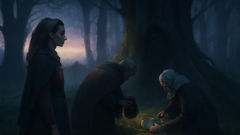
Anca visited Baba Ileana, who listened quietly as her granddaughter recounted every detail. The old woman nodded, her eyes shining with pride and sorrow. “Now you see,” she said, “the forest is not our enemy. We are its guests. We must walk softly and speak kindly.”
That year, the sickness lifted from the cattle, and crops flourished in the southern fields. Wildflowers carpeted the meadows, and the river ran clear again. The villagers learned to tread carefully and leave small gifts in gratitude. The children grew up with a new respect for the woods—bold enough to explore its beauty, wise enough to heed its boundaries.
But Muma Padurii was not banished by gratitude or fear. She remained a presence—sometimes glimpsed by hunters at dusk, her silhouette merging with tree trunks; sometimes heard in the rush of wind or the croak of a raven at dawn. She was neither wholly friend nor foe, but a spirit as wild and unpredictable as the seasons themselves.
Anca herself grew into a healer, guided by Baba Ileana’s wisdom and her own night among roots and shadows. She taught children how to read the language of the woods—how to listen to birdsong for warnings, how to thank a tree for its fruit, how to watch for the fox’s silent trail. In every lesson, she repeated Muma Padurii’s words: “The wild cannot be tamed, only honored.”
Years passed, and Anca became a legend herself—known as the Forest Daughter. Travelers sought her counsel; villagers trusted her remedies and respected her knowledge of woodland ways. She kept the old pact alive, reminding all that every gift from the forest was given, not taken.
Sometimes, on misty mornings, she found signs of Muma Padurii: a fresh braid of wildflowers left on her doorstep, a sudden hush among the trees, or a strange new song from the nightingales. And though she never again saw the old woman face-to-face, she felt her presence in every stirring leaf and every shadow that slipped between the pines. In honoring the wild, Anca and her village became part of the legend—their story woven into roots that run deeper than fear.
Conclusion
The legend of Muma Padurii lingers in the Carpathian woods, alive in every sigh of wind and shadowy path. To some, she remains a warning—a figure to frighten children home before dusk. To others, she is a symbol of wildness that cannot be subdued. For Anca and her village, she became a teacher. In learning to respect the old ways and honor the spirit of the forest, they found not only safety but a deeper belonging. The world beyond the pines is no less mysterious or dangerous than before, but it is richer for their understanding. When thunder rolls over Stânca Veche or mists shroud the fields, villagers still tell stories of the Mother of the Forest. And sometimes, when dusk falls and the air grows thick with secrets, they claim to hear her laughter among the branches—a sound neither cruel nor kind, but wild as life itself.


